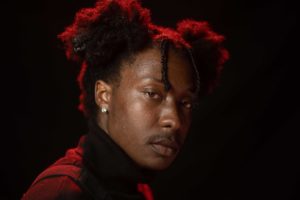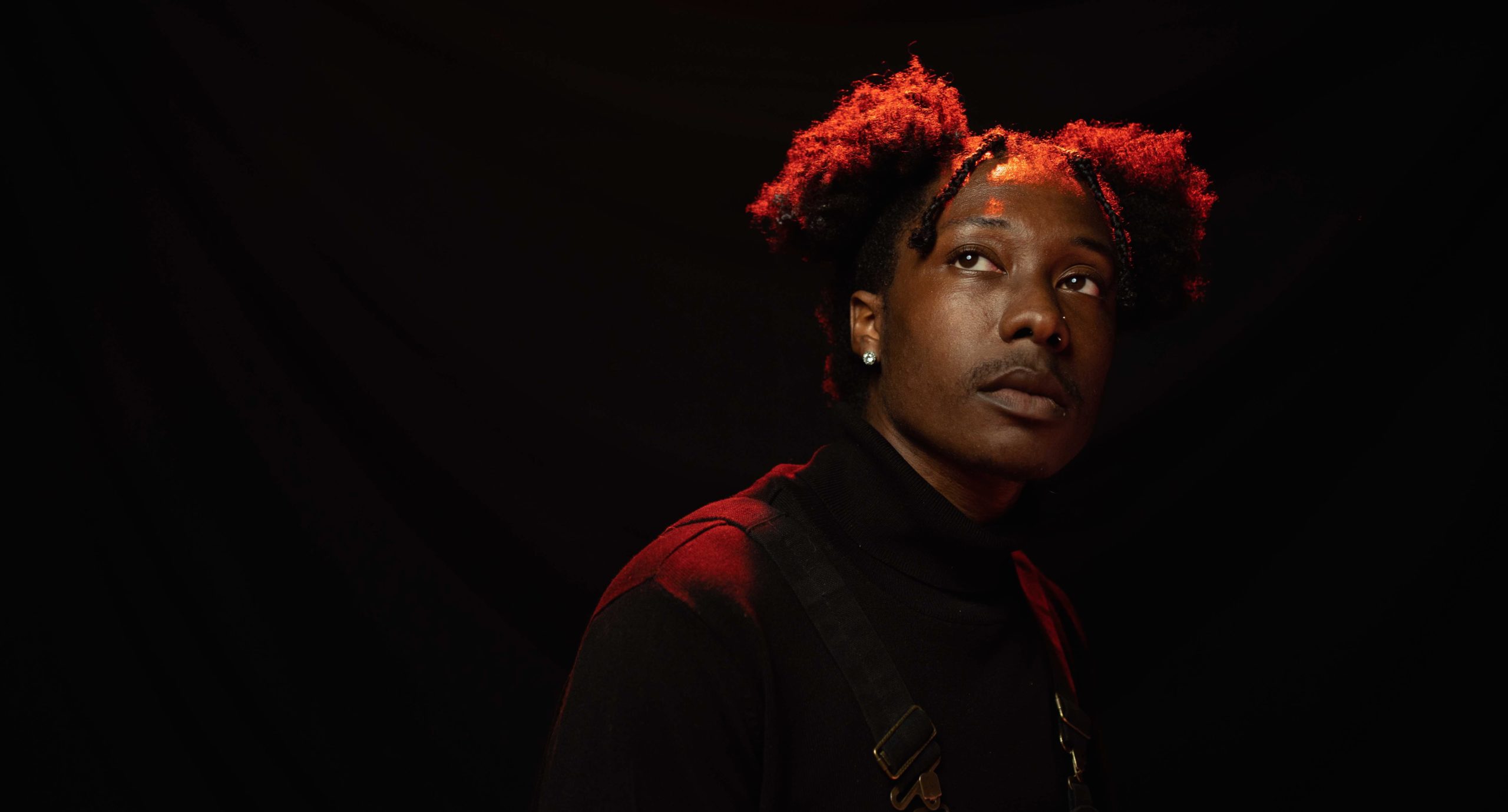For My Mama and Anyone Who Look Like Her is the type of project for which it seems like a disservice to call it a “rap album.” While McKinley Dixon will be the first to admit that it very much is a collection of rap songs, the term “rap” has come to signify a variety of sounds as broad as “indie rock,” which is most frequently used to refer either to big budget names like Arcade Fire and St. Vincent or your nextdoor neighbor, who you’ve had to listen to noodle on his guitar through quarantine as he works up the nerve to post his bedroom recordings on SoundCloud.
It’s hard to classify the dark, orchestral sound of the record’s first single, “make a poet Black” (introducing the record with the Memento-esque opening line, “OK, so how this shit happen / Yo ass is not rappin’”), not to mention the record’s prominent literary devices of time travel and reoccurring symbols of chains, maternal wrath, and ghosts, all of which feel familiar to the novels of Toni Morrison. While there are elements of jazz and other instrumental flourishes made mainstream by Kendrick’s To Pimp a Butterfly (to say nothing of other hip-hop influence—the instrumental on “brown shoulders,” for example, sounds like an inverse version of Madvillain’s “America’s Most Blunted”), Dixon’s unique songwriting process in collaboration with an improvisational band results in a genre as niche as grime or drill without sharing that sound with the artists he draws from, nor the artists he tends to share a stage with.
In our conversation, we discuss the influence of Morrison, storytelling rappers like Sha Stimuli, and theatrical white boys like My Chemical Romance on his music—and slip into something of a genre intervention, with Dixon going into some of the ways being labeled a “rapper” can limit Black artists.
What specific parallels do you see between your album and what you drew from Toni Morrison’s novels?
I think we can start with the titles. Artists, especially in Toni Morrison’s era, had to create titles that would draw you into it. Bluest Eye revolves around colorism, Song of Solomon around the transition of a man. It’s really cool how if you see these titles, you’re like, “I kinda know what this book’s about,” even before you’ve opened it. “For my mama and anyone who look like her” is kinda what my thought process was when I created the album—it’s what I see when I think of my music, and what I’ve learned and who I’ve learned from. Sometimes if I can’t write something I’ll go through her books, read a couple pages, and then I kinda figure out what I need to say because I get this feeling of, “She’s put this feeling out in such a beautiful way that now I’m inspired to do the same with what I think about the situation.”
Reading Beloved I remember being unprepared for the horror elements, which I was similarly surprised to pick up on in your album. Was that the intention for your inclusion of strings?
When a lot of people hear this album they’re like, “Oh, you draw a lot of inspiration from the thematic elements of To Pimp a Butterfly,” and actually I don’t. There’s definitely a time when rap wasn’t made with instruments, and then there was post–TPAB where you were more likely to hear it on the radio. But what really inspired me is I grew up listening to a lot of faux-theatrical artists like My Chemical Romance and The Used—you know, very dramatic, dressed up like mannequins, dancing around. I think watching that at a young age I was like, “OK, so the sky’s the limit, but it’s only the limit for certain people.” Then I grew up and got more into rap music, music that was more storytelling like Guru, Sha Stimuli, even a little bit of Blu, and being like, “So here’s the thematic elements that the artists I used to listen to never could have covered because they weren’t from these situations.”
“The vulnerability definitely came from rap music, the thematics came from jazz, and the theatrics came from listening to white boys dress like ringleaders and dance around saying things that don’t make no goddamn sense.”
And then as I was getting into my adult life it was like, “Now I also have the ideology and the language to be like Butterfly”—or mainly, honestly, Kamasi Washington’s The Epic. I could see that I could do arrangements, I could do whatever I want with everything I’ve learned: the theatrics of it, the art that I make outside of music, the experiences I have being Black and going through this and seeing how my Black, queer, and trans friends maneuver through these lives. The vulnerability definitely came from rap music, the thematics came from jazz, and the theatrics came from listening to white boys dress like ringleaders and dance around saying things that don’t make no goddamn sense.
I jotted down a lyric from the last song, “He made a genre to speak his pain,” and was curious how you felt live instrumentation helps you tell your story in ways you couldn’t before.
The way I do things is I’ll be reading, or out walking, talking with someone, being really high by myself, and have a really interesting thought and write it down. Once I have enough thoughts written down within the same feeling, then it becomes a whole verse. So then this verse I can put to a click, and then with the verse to a click and no other instruments behind it I can do whatever vocal things I want—I can go loud here, quiet there. Then when I send it out to the people who do the instrumentation for it I tell them, “You can feel it out yourself, but this is what I was feeling when I was writing and rapping these out.”
So I think the live instrumentation doesn’t allow me to be locked into a sort of structure. If somebody hears this thing and they’re like, “I really felt this when I heard you speak it like this,” and they put that in the bass or the guitar or even the strings, then it makes it seem like it’s one unified thing because we’re all reacting to what I was doing. For live shows it’s incomparable. I can say whatever I want and the band will just be playing. That’s the coolest thing about having instrumentation is when I get to play live, and then I can be yelling really loudly or singing quietly, jumping off the stage, beating people up, I don’t know.

How big is your live band?
When I first started doing live stuff it was sax, violin, guitar, drums, bass, and I think keys—just a wall of sound, kinda ridiculous. That was 2017, and as it went on we slimmed it down to guitar, drums, and bass.
Did you start performing without a band, or have you always been doing it this way?
My first show ever was in Lucy Dacus’ house—before Lucy Dacus was Lucy Dacus, and before I was really even doing live music. I think it was 2016, and it was just me doing the beats and rapping and my friend playing saxophone. I was getting shows, but people were kind of locking me into rap, and not in a cool way. I feel like your audience has a lot more power over what genre you are than you think, so I was doing rap shows where it’s like 10 people on a bill, 15 minute sets.
So when you started, were you not specifically trying to get into rap?
Oh, no, I’m definitely a rapper. I love being a subgenre of rap music, I think that a lot of the things that are coming out now could technically be considered subgenres of rap music if people’s intentions were better. With me, it was definitely this thing where rap isn’t valued too much in a live setting without certain ramifications. Honestly I think that’s because it’s easy for white people to commodify rap and not make it an interesting thing.
“Because we don’t allow Black people to be vulnerable, when we hear it in rap music we’re like, ‘This is just really catchy.’ We’ve normalized that we don’t hear this from people who look like me. We hear songs and we’re like, ‘This is a catchy beat, I love this,’ when in actuality it’s someone processing pain.”
I think it doesn’t help birth community, but also—and this might be a reach—because of white supremacy I kind of feel like putting rappers into sets like that forces them to be in competition with each other unknowingly. You’re kind of like, “Damn, why was my set so short, and why did I go after this person and before this person?” and you kind of get annoyed with it. When I do things at, like, SXSW, people try to cut my sets short. I’ve seen that resentment kind of forms when you try to police somebody because they’re a rapper.
I notice press releases often refer to 20-year-old white guys as “genreless” when they make music that incorporates rap, while when a Black person does it it’s like, “Oh, here’s another rapper.”
Exactly, and that’s what was hitting with me. I did one show with an artist who’s a big popular band now, and the whole night people were like, “Who are you?” And I’m like, “I’m at the merch table, who are you coming up to me at the merch table?” And then they’d pull up my information and be like, “Oh, Lucy Dacus and Crumb follow you, that’s what you’re doing,” and I’m like, “No, no disrespect but I’m completely different than these people that you had the nerve to come up to the merch table to tell me I’m here for.” Then I get on stage and everyone wants to tell me, “Oh my god, you sound like, poo-poo pee-ee, Kendrick Lamar, The Roots,” and it’s like, how does this work? Before I got on here no one fucked with me, now I’m on here and people aren’t fucking with me in the audience, but then I get off and everyone’s like, “Oh my god, do you know Anderson .Paak?” It’s like, “Yeah, motherfucker, I know Anderson .Paak, I’m a rapper [laughs]. What do you mean?”
You referred to the album as one in which you process events in your lifetime, differentiating it from other musicians who use “heavy energy” and “full emotion” without being able to really process anything. Could you elaborate on that?
Rap music is way heavier than a lot of people think it is, even people making rap music. Because we don’t allow Black people to be vulnerable, when we hear it in rap music we’re like, “This is just really catchy.” We’ve normalized that we don’t hear this from people who look like me. We hear songs and we’re like, “This is a catchy beat, I love this,” when in actuality it’s someone processing pain.
I also think that when you’re making an album, you kind of become aware, as a Black person, that trauma does sell, and people don’t listen to you if they think you don’t have anything to say. When general sadness comes from a white person, I feel like people don’t really try to process the reasons behind them creating a whole album like that, which then leads them to fall into the trap of, “I must create the second album to sound like this because the people are really into this.” Capitalism kind of makes that into a cycle, and I feel like if you don’t at least find the event that is inspiring you to create this music, and then try to process it through the music, then you come out with a very stale discography. FL







